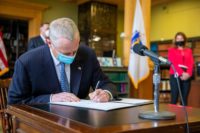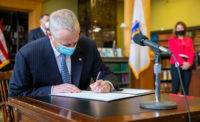Massachusetts Leaves Transportation Climate Initiative
Regional emissions reduction plan withers as states cut support

Massachusetts is the latest state to drop out of the Transportation Climate Initiative.
Photo courtesy Wikimedia Commons
Massachusetts is the latest state to drop out of the Transportation Climate Initiative, a multi-state collaboration to cut transportation sector emissions that has lost traction in recent months amid pandemic economic concerns and potential effects on already rising fuel prices.
The administration of Gov. Charlie Baker (R), a long-time proponent of the program, cited waning interest among participants among the reasons for cutting ties with an effort that initially attracted interest from more than a dozen northeast and Mid-Atlantic states and the District of Columbia.
Discussed for more than a decade, the initiative's centerpiece cap-and-invest program would have allowed participating states to limit emissions from cars and trucks, then auction “allowances” to vehicle fuel suppliers for their contributions to emissions under the cap. Revenue from the auctions would then be invested in clean transportation programs.
Although the program had touted the potential to cut the region’s greenhouse gas emissions by 26% during the next decade and generate hundreds of millions of dollars in revenue, opponents claimed fuel suppliers would simply pass the added cost of allowances to consumers, in effect creating a new fuel tax that could potentially exceed its projected increase of 5 to 9 cents per gallon.
Environmental groups such as the Sierra Club also faulted the program’s emissions reduction goals for not going far enough.
Interest cooled during 2020 as states’ climate improvement ambitions took a backseat to pandemic-related economic uncertainties. Last December, only Connecticut, Rhode Island and DC joined Massachusetts in formally announcing plans to move forward with the cap-and-invest program. Earlier this month, however, Connecticut Gov. Ned Lamont (D) conceded dim prospects for its prospects in the state legislature.
In a Nov. 18 statement announcing Massachusetts’ withdrawal, a spokesperson for Baker concluded that the program, “is no longer the best solution” for the state’s transportation and environmental needs.
With Massachusetts set to receive at least $10 billion from the federal infrastructure funding package, and tax revenue from existing sources trending upward, the spokesperson said the state is “better positioned to upgrade its roads, bridges and public transportation systems, while also making investments to reduce transportation emissions, deliver equitable transportation solutions and benefits and meet the state's ambitious climate goals.”






